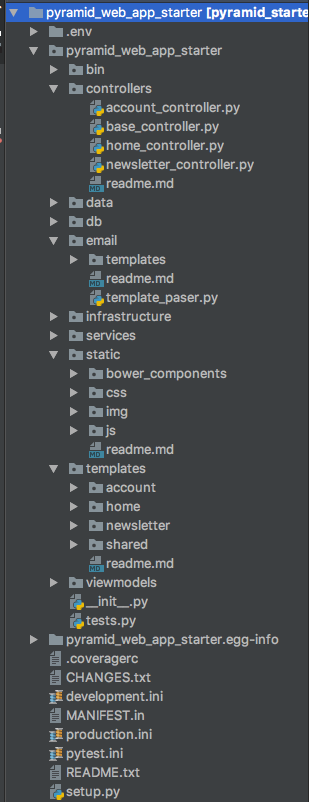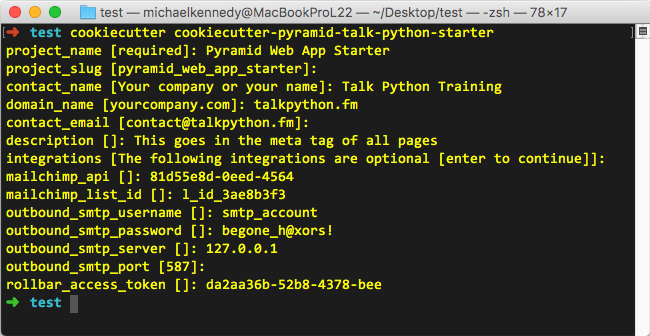An opinionated Cookiecutter template for creating Pyramid web applications starting way further down the development chain. This cookiecutter template will create a new Pyramid web application with the following benefits and more:
- Factored and organized: This code was generalized out of a large, professional web application
- Master layout template: Comes pre-configured with a master layout template. Navigation, CSS, JS, etc is factored into a single template file and is reused across all views
- Chameleon language: This template uses the chameleon template language (the cleanest template language for Python - we did say opinionated right?)
- Pyramid Handlers: Code is factored into handler / controller classes. You have the full power of object-oriented programming immediately available
- Secure user management: The app comes with full user management. Users can register, log in and out, and reset passwords. We use the passlib package for secure user storage using best practices SQLAlchemy data access: Comes with SQLAlchemy ORM preconfigured using sqlite
- Bootstrap and modern design: As you can see from the screenshot below, the app comes with bootstrap and fontawesome. It uses a free, open-source theme and images used under CC-Attribution.
- Logging with LogBook: A logging system for Python that replaces the standard library’s logging module. It was designed with both complex and simple applications in mind and the idea to make logging fun
- Runtime error monitoring with Rollbar: Rollbar adds runtime notifications and detailed error tracking and it comes pre-configured in this template
- Mailing list integration: Comes with Mailchimp integration. Just enter your API key and list ID to start collecting and managing users for your mailing list
- Outbound email with templates: The app has a set of static HTML files with placeholders that are loaded by the outbound email system and populated with user data
- Bower static resource management: Most templates are based on out-of-date files (css templates, js, etc.). This template uses bower for it's static files. This means a single CLI command will get you the latest everything.
- Fast pages that are never stale: Every static resource is referenced with our own cache busting system. This means you can use extremely aggressive caching for performance on static files yet they immediately invalidate upon changes
- Built-in CMS: The site supports loading landing pages and other static content from the database while still supporting the common look and feel.
- Comes with an entire online course: This template is built from the final project in Python for Entrepreneurs, a 20 hour course on building professional web apps in Python and Pyramid from Talk Python Training
Here's a screenshot of the home page. You also get much more as you navigate other sections of the web app.
Here's the project folder structure:
To use this template you just run the single command:
cookiecutter https://github.com/mikeckennedy/cookiecutter-pyramid-talk-python-starter
Answer the cookiecutter prompts (notice how smart defaults are suggested anywhere possible):
[Note: Once you have run cookiecutter with the full URL, it is cached locally and can be run with just the template name.]
You will need to install Cookiecutter first:
pip3 install --user cookiecutter
(Use pip command for Python 3 on Windows)
The Pyramid web framework offers a handful of nice starter templates. They have recently moved to Cookiecutter as the primary way to scaffold new Pyramid web applications.
There are a few existing templates but they are built to be bare bones and less opinionated so they are broadly applicable. They are:
pyramid-cookiecutter-starter
URL dispatch for routing and either Jinja2, Chameleon, or Mako for templating
pyramid-cookiecutter-alchemy
SQLite for persistent storage, SQLAlchemy for an ORM, URL dispatch for routing, and Jinja2 for templating.
pyramid-cookiecutter-zodb
ZODB for persistent storage, traversal for routing, and Chameleon for templating
Pyramid cookiecutters released under the Pylons Project differ from each other on a number of axes:
- the persistence mechanism they offer (no persistence mechanism, SQLAlchemy with SQLite, or ZODB)
- the mechanism they use to map URLs to code (URL dispatch or traversal)
- templating libraries (Jinja2, Chameleon, or Mako)
If this web app is interesting to you and you'd like to dig way deeper into all of these topics, we have a 20-hour online course that goes into detail in each area of the app and more.



